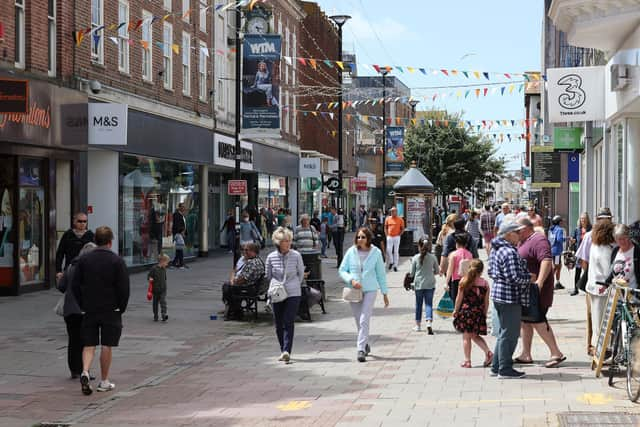Worthing 'gets better connected': 4g/5g small cells technology to be installed
and live on Freeview channel 276
‘In a first of its kind partnership’, wireless infrastructure company Dense Air has teamed up with West Sussex County Council and Worthing Borough Council – as well UK mobile operators.
Dense Air is deploying 4g/5g small cells technology, that will sit on top of existing infrastructure – such as streetlights or buildings – to provide a shared cellular network solution. These small cells will be deployed throughout the beach promenade and town centre in Worthing.
Advertisement
Hide AdAdvertisement
Hide AdThe project is called Beach Energy-efficient Accessed Cluster for High-demand (BEACH) and is expected to bring ‘high speed 5G access to more than 100,000 people in Worthing’ – providing ‘crucial network connectivity and flexible, high speed bandwidth for all’.


A spokesperson for project leader Dense Air said: “Crucially, the BEACH Project also helps close the digital divide between the residents of Worthing and those of urban areas who enjoy stronger, more reliable mobile service.
"By sharing network infrastructure costs across multiple carriers and efficiently utilizing the existing gigabit fiber footprint, this project provides Worthing with the wireless mobile connectivity needed for the town to thrive and grow in the 21st century. As demand grows, the BEACH Project’s nimble shared architecture can scale to deliver the same high bandwidth that denser metro areas enjoy.”
Dense Air said Worthing’s current broadband infrastructure is ‘strained under surges of demand’ during peak summer months and is ‘ill- equipped’ to recover during the off season – ‘leaving visitors and residents alike struggling to get online year round’.
Advertisement
Hide AdAdvertisement
Hide AdAs a ‘vibrant coastal town and holiday destination’, the county council revealed that Worthing ‘experiences significant daily and seasonal fluctuations in visitor numbers and population’.
A spokesperson added: “Increasing numbers of people and businesses trying to make calls or get online via mobile phones stretches the existing cellular coverage and outdoor connectivity frequently does not support transactions wirelessly or online.
“BEACH will create a cellular network, able to be shared by mobile network operators and hosted on local authority-owned assets, capable of flexing its capacity to supply the connectivity needs of users at peak times.”
The £9m project, funded by the Department of Science, Innovation and Technology, will deploy optimised and low-impact small radio cells along a pilot area encompassing the town centre and beach front. These will support ‘faster, more reliable mobile speeds and capacity’ whilst ‘also saving energy across the network’.
Advertisement
Hide AdAdvertisement
Hide AdAs the lead authority partner, West Sussex County Council will support the project by hosting the equipment on council owned assets, project management support and stakeholder engagement.
Steve Waight, cabinet member for digital infrastructure, said: “We are working innovatively with technology operators to improve digital connectivity to support use by residents, businesses and visitors and ensure investment supports a strong, vibrant economy.
“Excitingly, intelligent power management by the BEACH network will decrease power consumption at times of low demand and store power for times of peak demand, saving energy and supporting our county-wide agenda to de-carbonise by 2030.”
The new cells will also provide the cellular coverage needed for electronic payments – both at permanent businesses and for traders attending events or markets. Enhanced network coverage will also further support the delivery of local events and enterprises requiring connectivity and enable promotion and marketing on social media including the ability to live stream events.
Advertisement
Hide AdAdvertisement
Hide AdJohn Turley, Worthing Borough Council’s cabinet member for resources, said: “Having a fast, reliable mobile connection is vital for modern life, whether we’re working, shopping or on holiday.
“Thanks to the CityFibre project, Worthing has some of the fastest broadband in the UK. BEACH will build on this by dramatically improving connectivity for everyone that comes to our town centre and seafront and helping our businesses to thrive, all in a sustainable, energy-efficient way.”
BEACH will begin deploying 4G small cells on council-owned assets early in 2024. The county council said new cells will provide a ‘significant improvement’ in cellular services across the network to ‘meet the increased demand for future 5G services’.
Sir John Whittingdale, minister for data and digital infrastructure, said: “Whether you’re in a busy city centre or a rural village, a fast and reliable mobile connection is vital to staying in touch, accessing services and doing business. In order to secure that, we need to embrace a diverse and secure range of technology that will underpin the network.
Advertisement
Hide AdAdvertisement
Hide Ad“The projects we’re backing today with £88 million in Government research and development investment will use innovative Open RAN solutions to make our mobile networks more adaptable and resilient, with future-proofed technology to support bringing lightning-fast connections across the country for many years to come.”
BEACH is supported by two UK-based mobile network operators who will ensure the project’s success as a world-first shared deployment on new infrastructure developed in line with the regulatory JOTS Framework and utilising O-RAN (Open Radio Access Network) at a scale that is designed to be repeatable in other local authority areas.